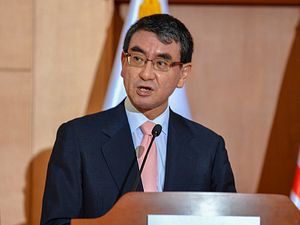Japan has dropped references to maximizing pressure on North Korea in its latest annual Diplomatic Bluebook. It has also removed a line asserting that four islands at the center of a territorial dispute with Russia “belong to Japan.”
The changes seem to reflect Tokyo’s desire to give itself more space for talks with Pyongyang and Moscow, respectively.
The Diplomatic Bluebook, published every year, details the Japanese government’s current stance on a variety of foreign policy matters.
Last year’s version noted that Japan was cooperating closely with the United States and South Korea – and coordinating with other countries such as China and Russia – “to maximize pressure on North Korea by all available means.”
The Japanese government had been one of the strongest supporters of the pressure campaign against North Korea. However, the past year has been characterized by a flurry of diplomacy, including two denuclearization-focused summits between U.S. President Donald Trump and North Korean leader Kim Jong Un. Kim has also held face-to-face meetings with the leaders of South Korea, China, and Russia.
Japan’s new Diplomatic Bluebook, published on April 23 after a cabinet meeting, does not repeat the sentence about maximizing pressure on the Kim regime.
In response to a question about the change, a spokesperson for Japan’s Ministry of Foreign Affairs said the latest bluebook “reflects the comprehensive assessment on the latest situation surrounding North Korea” such as the summits between Trump and Kim in Singapore and Hanoi.
“We are determined to continue various efforts under our basic principles of resolving outstanding issues such as abduction, nuclear and missile issues comprehensively, settling the unfortunate past and normalizing relations between Japan and North Korea,” the spokesperson added.
It’s another subtle shift in Tokyo’s positioning in recent times. In March, The Diplomat noted that Japan had taken a tentative step toward dialogue with North Korea by deciding against jointly tabling a United Nations resolution condemning the regime’s human rights record. That was the first time in more than a decade that Tokyo had not joined with the European Union to jointly present such a motion to the UN Human Rights Council.
A particular priority in Japan’s diplomacy is to clarify the fate of Japanese nationals who were abducted by North Korean agents in the 1970s and 1980s. Five abductees were repatriated to Japan in 2002, after Junichiro Koizumi, then the Japanese prime minister, met with Kim’s father and predecessor Kim Jong Il. Pyongyang says the other admitted abduction victims have passed away, but Tokyo believes more may still be alive in North Korea. Ever since the United States shifted its emphasis from pressure to talks last year, Japanese Prime Minister Shinzo Abe has repeatedly signaled his willingness to meet with Kim, suggesting that such efforts would be focused on resolving the abduction issue.
Abe is also working to settle a peace treaty with Russia, but a key obstacle remains the territorial dispute over four islands seized by the Soviet Union in the final stages of World War II. The islands are known as the Southern Kurils in Russia – which controls them – and the Northern Territories in Japan. The latest Diplomatic Bluebook does not include the phrase from last year that “Japan’s position is that the four Northern Islands belong to Japan.”
A spokesperson for Japan’s Ministry of Foreign Affairs told The Diplomat:
True – the latest bluebook does not include the exact sentence that you referred to as above. In the meanwhile, our government’s legal position on the Northern Islands remains the same. We continue to pursue negotiations patiently under the basic policy of concluding a Peace Treaty based on the resolution of territorial issues.
Observers point to the difficulty of reaching an agreement acceptable to both sides. Russian President Vladimir Putin told Abe in September last year that the pair should fast-track peace treaty talks “without preconditions.” Later in the year, they agreed to accelerate talks on the basis of the 1956 Joint Declaration, which, as James Brown has highlighted, indicated Moscow would transfer two small islands – Habomai and Shikotan – to Japan after the conclusion of a peace treaty. Brown noted in his article for The Diplomat in March that the Joint Declaration was silent about the much larger islands of Iturup and Kunashir, and the idea of settling for just two of the islands could trigger a political and public backlash in Japan. Japanese Foreign Minister Taro Kono is due to travel to Moscow for further talks with Russian counterpart Sergey Lavrov on May 10.
These shifts aside, on big-picture issues, the bluebook maintains continuity in Japan’s diplomatic outlook. For example, the document emphasizes the ongoing importance of the alliance between Japan and the United States, saying that it is more solid than ever as a result of the relationships of trust between the leaders and foreign ministers, the Jiji Press news agency reported.
The document also trumpets as a diplomatic success the recent improvement in ties between Tokyo and Beijing. The mutual visits of Abe and Chinese Premier Li Keqiang in 2018 helped to return Japan-China relations to a normal track, allowing them to enter a new phase, according to the Jiji Press article. By contrast, Kyodo News reported, Japan’s bilateral relationship with South Korea is described as being in an “extremely difficult situation” amid tensions over war history-related issues.
To date, the Diplomatic Bluebook is available only in Japanese, with an English language version expected to be published later in the year.

































